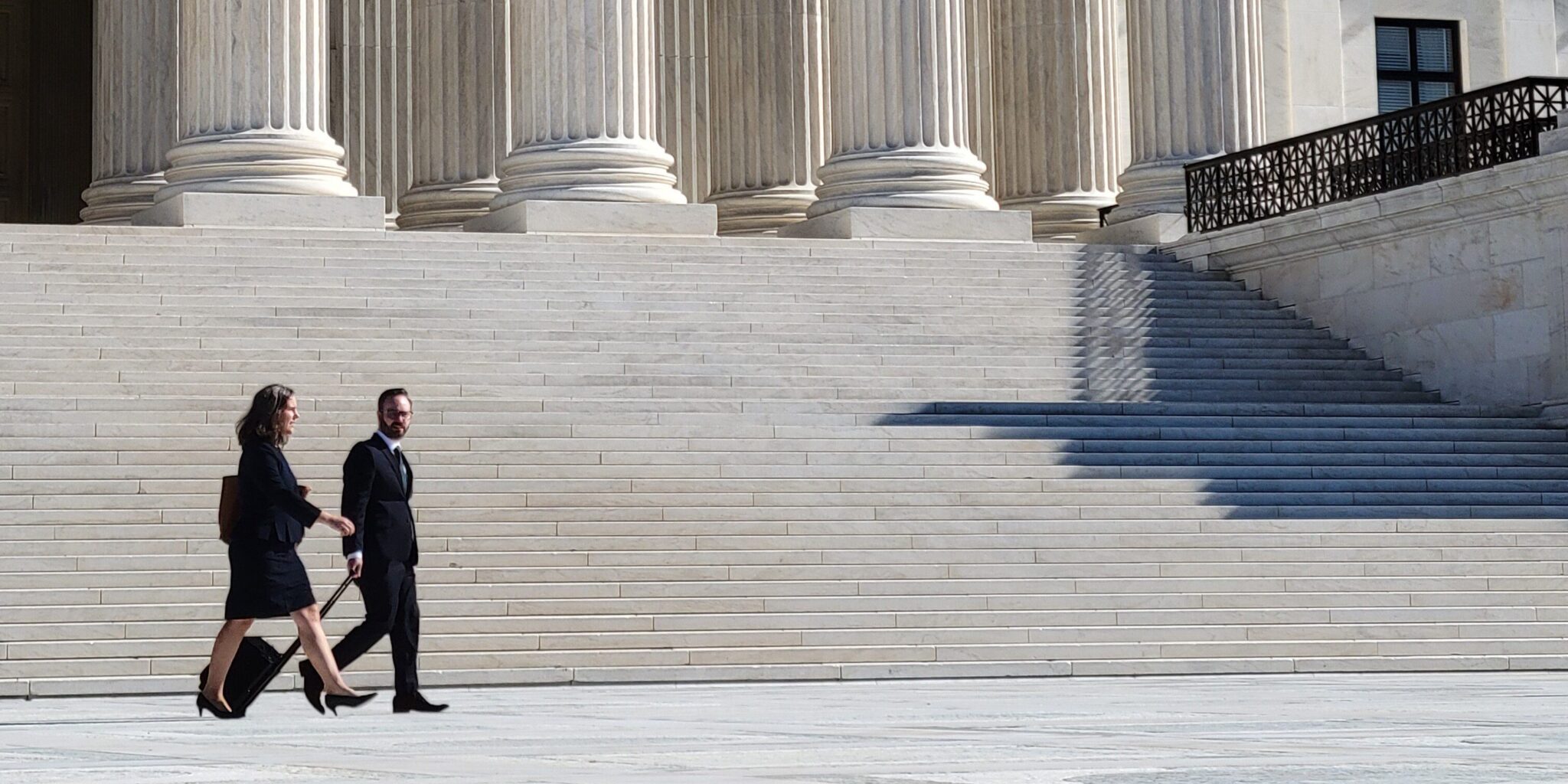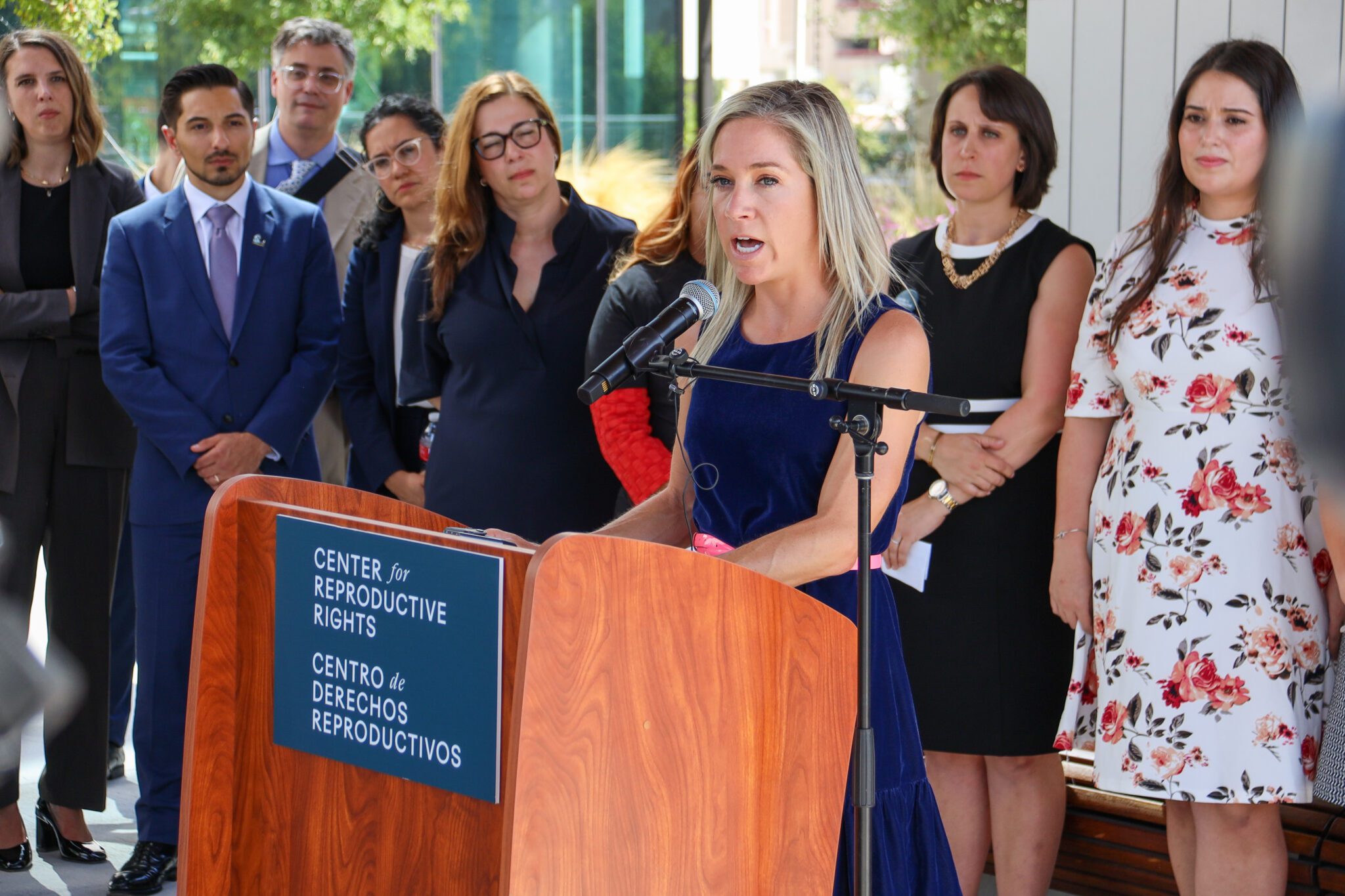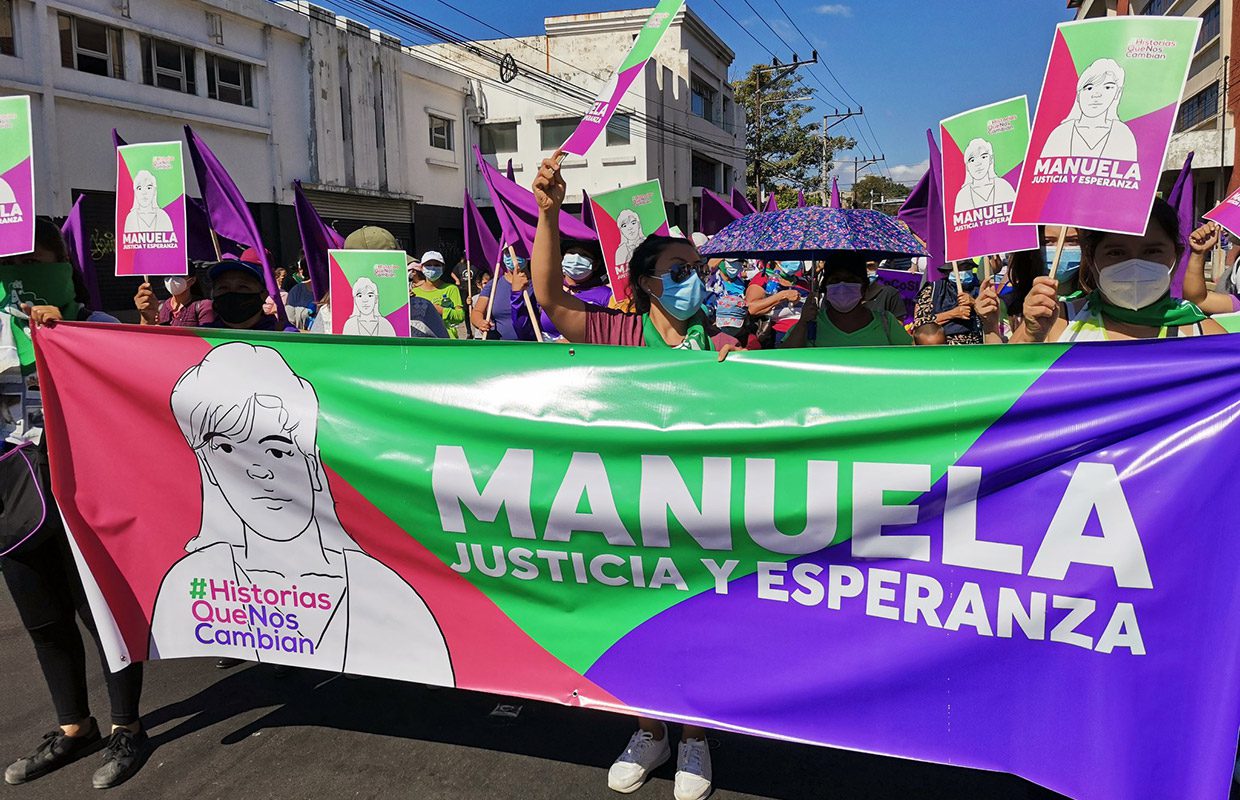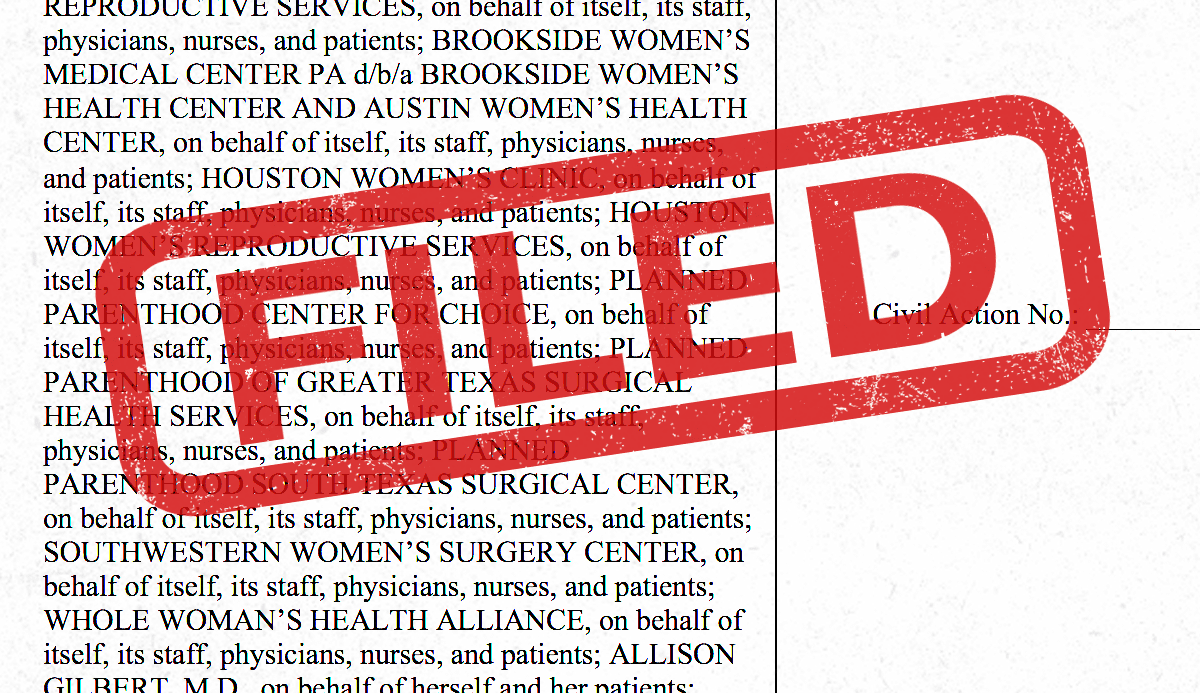Recent Case Highlights
The Center for Reproductive Rights is litigating dozens of cases in state, national and regional courts against harmful laws that restrict access to abortion and other reproductive rights.
Below are updates on some of the Center’s current and recent cases.
Honduras’s Abortion Ban Being Challenged at the UN Human Rights Committee
The Center and the Centro de Derechos de Mujeres (CDM) are challenging Honduras’s total abortion ban in a case involving an indigenous Honduran woman who became pregnant as a result of rape—then was forced to give birth after being denied emergency contraception and abortion care. The case marks the first time Honduras has been brought before the UN for its total abortion ban.
Hearing Held in Tennessee “Medical Exceptions” Case
A hearing in Blackmon v. State of Tennessee, which challenges the state’s total abortion ban as applied to pregnant people with emergent medical conditions, was held April 4 at the Tennessee Twelfth Judicial District Court.
View photos and media coverage here.
Read about the Center’s medical exceptions cases.
Medical Exceptions to U.S. State Abortion Bans
Representing women denied abortion care despite facing severe and dangerous pregnancy complications, the Center seeks to clarify medical exceptions to U.S. state laws that have outlawed abortion and put health, lives and fertility at risk.
Florida Supreme Court Allows State to Ban Abortion
The Florida Supreme Court on April 1 overturned decades of precedent and ruled that the Florida constitution’s explicit right to privacy no longer protects abortion rights. By upholding the state’s 15-week abortion ban, the Court also cleared the way for its six-week ban to take effect.
U.S. Supreme Court Hears Case That Threatens Access to Abortion Medication
The U.S. Supreme Court heard arguments March 26 in Alliance for Hippocratic Medicine v. FDA, a case filed by anti-abortion advocates challenging the FDA’s approval of the abortion drug mifepristone and seeking to remove it from the market nationwide.
Kenya Court of Appeal Affirms Right to Respectful Maternal Health Care
In a significant victory for all Kenyans, the Court of Appeal of Kenya affirmed the right to respectful maternal health care in the case of Josephine Majani—a pregnant woman who was physically and verbally abused by hospital staff, and left to deliver her baby on a concrete hospital floor. The Court’s decision, issued February 23, upheld a landmark 2018 judgment by the Kenyan High Court defending the human rights of Majani in the case, which was brought by the Center.
Center Sues Hawaiʻi to Protect Midwifery Care
To restore access to safe, respectful, and culturally informed maternal care in Hawaiʻi communities, the Center and its partners filed a lawsuit on February 27 asking a state court to block a midwifery restriction law. The law is preventing pregnant people from receiving pregnancy and birth care from trusted, skilled midwives and has been particularly devastating for Native Hawaiian midwifery practitioners and families of color.
Center Sues Michigan to Align Abortion Laws with State’s Reproductive Freedom Amendment
To help ensure that Michigan’s abortion laws align with the amendment approved by voters in 2022 to enshrine reproductive freedom in the state’s constitution, the Center filed a lawsuit on February 6 challenging three burdensome state abortion restrictions still on the books. “With this lawsuit, we hope to eliminate archaic and harmful restrictions that are outright contrary to the RFFA and help ensure the state’s laws reflect the will of Michigan voters,” said Rabia Muqaddam, senior staff attorney at the Center.
Center and Partners Warn SCOTUS About “Junk Science” in Medication Abortion Case
An amicus brief submitted January 30 to the U.S. Supreme Court by the Center, the American Civil Liberties Union, and The Lawyering Project in support of the FDA’s 2016 and 2021 actions on mifepristone outlines how the lower courts, in rejecting the robust scientific basis for the FDA’s actions, relied on “patently unreliable witnesses” and “ideologically tainted junk science” in their rulings. The brief was filed January 30 in Alliance for Hippocratic Medicine v. FDA. The case—which threatens access to the abortion medication nationwide—will be argued at the Supreme Court on March 26.
Read more on the brief and the case.
North Dakota Court Denies Request to Block Abortion Ban While Case Proceeds
In a preliminary ruling on January 23, a North Dakota state court denied the Center’s request to block the state’s abortion ban in situations where an abortion is necessary to preserve the life or health of a pregnant person. The court did not address the constitutional questions that are the focus of the case and will issue a final ruling after a hearing on the merits of the case. In March 2023, the North Dakota Supreme Court blocked the state’s “trigger ban” as a violation of the state’s constitution. The following month, state lawmakers passed another total abortion ban, which is the law now at issue in the case.
Read more about the case here.
More Women Denied Abortion Care Join Case Against Tennessee
On January 8, 2024, four more women joined the Center’s lawsuit against Tennessee, Blackmon v. State of Tennessee, after being denied medically necessary abortion care for their severe and dangerous pregnancy complications. There are now nine plaintiffs in the case, which challenges Tennessee’s total abortion ban as applied to pregnant people with emergent medical conditions. The Center also asked the court for a temporary injunction, which would immediately block Tennessee’s abortion ban as it applies to dangerous pregnancy complications while the case proceeds.
Idaho “Medical Exceptions” Case to Continue After Court Rejects State’s Motion to Dismiss
An Idaho Court on December 29, 2023 rejected the state’s motion to dismiss Adkins v. State of Idaho, a case challenging the limited scope of the medical exceptions to Idaho’s two abortion bans: a total trigger ban and a “vigilante”-style six-week ban. The court’s ruling allows the case to proceed. The case was brought on behalf of four women who were denied abortion care despite facing severe pregnancy complications; two Idaho physicians who provide obstetrical care; and a professional membership organization consisting of Idaho physicians, medical residents and medical students.
Supreme Court Will Hear Case That Could Undermine Abortion Pill Access Nationwide
The U.S. Supreme Court agreed on December 13, 2023 to take up Alliance for Hippocratic Medicine v. FDA, a case filed by anti-abortion advocates challenging the FDA’s approval of the abortion drug mifepristone and seeking to remove it from the market nationwide. Arguments have been scheduled for March 26. The case reaches the Supreme Court after an appellate court partially upheld a lower court ruling attempting to reinstate burdensome pre-2016 restrictions on mifepristone that make it much harder to access. That order is currently blocked and will remain blocked until the Supreme Court rules, likely in June 2024.
Texas Supreme Court Denies Woman’s Request for Emergency Abortion Care
The Texas Supreme Court ruled on December 11, 2023 to deny a pregnant woman’s request for emergency abortion care in the state. The plaintiff, Kate Cox, recently received confirmation that her pregnancy had Trisomy 18 and had no chance of survival. She was warned by her OB-GYN and MFN specialist that continuing to carry the pregnancy to term could jeopardize her health and future fertility. The Center for Reproductive Rights filed the case, Cox v. Texas, on December 5, asking a state court to temporarily block Texas’s abortion bans so Cox was able to obtain the urgent care she needed to avoid the dangerous risks of being forced to stay pregnant.
Center Argues “Medical Exceptions” Case at the Texas Supreme Court
On November 28, 2023, the Center argued at the Texas Supreme Court to urge the court to uphold an injunction issued in August by a Texas district judge that the state’s abortion bans as they apply to patients with dangerous pregnancy complications. The ruling, which was appealed by Texas, also clarified that doctors can use their good-faith medical judgment to determine when to provide abortion care in those situations. The case, Zurawski v. State of Texas, was brought on behalf of Texas physicians and women denied abortion care despite facing dangerous pregnancy complications.
Kansas State Court Blocks Abortion Restrictions
Although Kansas voters overwhelmingly rejected efforts to eliminate the fundamental right to abortion from the state constitution in 2022, state lawmakers enacted several onerous, harmful abortion restrictions that diminished access to care. On October 30, 2023, a Kansas state court judge blocked those restrictions, which were challenged by the Center and its partners in a lawsuit brought in June on behalf of Kansas abortion providers. The case argued that the restrictions violated the state constitution, including the rights to abortion and free speech.
Learn about cases with global impact.
Landmark Cases
Find out about court rulings secured by the Center that have transformed the landscape of reproductive health and rights for people around the world.
Georgia Supreme Court Allows Six-Week Abortion Ban to Remain in Effect
On October 24, 2023, the Georgia Supreme Court ruled to allow the state’s law banning abortion after approximately six weeks of pregnancy to remain in effect, reversing a lower court decision that struck down the law.
The lower court had ruled that since the Georgia Constitution prohibits the legislature from passing laws that violate either the state or federal constitution, the abortion ban was void since it violated Roe v. Wade when it was enacted in 2019.
The case, SisterSong v. Georgia, will return to the trial court, which has not yet ruled on the remaining claims brought by the plaintiffs that the ban violates Georgians’ rights to privacy and equal protection under the state Constitution.
Court Blocks Montana Clinic Licensing Law
On September 27, 2023, a court blocked a Montana law challenged by the Center that requires abortion clinics to be licensed and the state to issue regulations detailing licensure requirements. Although the law was set to take effect October 1, in the three months since the law was enacted, the state has yet to even propose regulations, making it impossible for clinics to comply by the effective date.
Kenyan Court Exonerates Mother and Health Care Provider From Abortion Charges
After a five-year court battle, a health care provider and the mother of an adolescent girl—represented by the Center and the Reproductive Health Network of Kenya (RHNK)—were cleared of charges of procuring an abortion by a court in Makadara, Kenya. The September 25, 2023 dismissal of the case, Republic v. Samson Mwita & Grace Wanjiku, aligns with earlier court rulings in Kenya declaring that it is illegal to arrest and prosecute abortion patients and providers, and it sends a clear message affirming abortion as a health care right.
Another Challenge to South Carolina Abortion Ban
The Center and its partners, on behalf of abortion providers in the state, filed a new challenge to South Carolina’s six-week abortion ban. The lawsuit, filed September 14, 2023, asks the South Carolina Supreme Court to resolve ambiguity raised in its August decision that upheld the ban.
Explore our cases in depth.
Case Archive
Index of the Center’s court cases by year, region and issue.
“Medical Emergency” Exceptions Complaints Filed in Three More States
Expanding its work on behalf of patients denied abortion care despite severe and dangerous pregnancy complications, on September 12, 2023, the Center filed complaints in Idaho, Tennessee and Oklahoma. The complaints seek to ensure that pregnant people in such dire situations can access abortion care and that doctors have clarity on “medical emergency” exceptions in their state’s abortion bans.
Read about the complaints here.
South Carolina Supreme Court Upholds Abortion Ban Almost Identical to One it Threw Out in January
After the makeup of the court changed, the South Carolina Supreme Court on August 23, 2023, upheld a law banning abortion at approximately six weeks of pregnancy. The ban is almost identical to the one it struck down in January and the ruling that will devastate abortion access in the state and throughout the region.
Court Denies Center’s Request to Ensure Access to Abortion Drug in Three States
On August 21, 2023, a federal court in Virginia denied the Center’s request for a preliminary injunction that would have protected access to the abortion pill mifepristone in Virginia, Montana, and Kansas. The Center filed the request in Whole Woman’s Health Alliance v. FDA (WWH v. FDA) in May seeking to buttress the current access to mifepristone in line with a decision issued by a Washington court applicable to 17 states and D.C. In its ruling in WWH v. FDA, the court acknowledged the safety and importance of mifepristone, and the case will proceed in the trial court.
Access to mifepristone is threatened by an April 7 ruling by a Texas federal court in a separate case, Alliance for Hippocratic Medicine v. FDA, that attempted to block the FDA’s long-standing approval of the drug. The ruling in WWH v. FDA came days after the Fifth Circuit Court of Appeals upheld in large part the Texas court’s ruling. (The Fifth Circuit ruling has not taken effect due to a U.S. Supreme Court stay, and the Government has asserted that it will appeal.)
Read about the WWH v. FDA case here.
Texas Ruling to Allow Abortions for Severe Pregnancy Complications is Blocked While Appeals Proceed
In a ruling August 4, 2023, on Zurawski v. State of Texas, a Texas district judge issued an injunction blocking Texas’s abortion bans as they apply to dangerous pregnancy complications, clarifying that doctors can use their own medical judgment to determine when to provide abortion care in emergency situations. The ruling also denied the state’s request to throw out the case, and it found S.B. 8—Texas’s citizen-enforced abortion ban—unconstitutional. The judge recognized in her ruling that the women who brought this case should have been given abortions.
The state immediately appealed the ruling directly to the Texas Supreme Court, putting the injunction on hold while appeals proceed. The Texas Supreme Court has set oral argument for November 28.
Read more about the ruling here.
Search case news.
Hearing in Zurawski v. State of Texas
A Texas state court will hear testimony and arguments July 19-20, 2023, in Zurawski v. State of Texas, a lawsuit filed by the Center on behalf of Texas women denied abortion care despite facing severe pregnancy complications and risks to their health, fertility and lives.
The hearing is scheduled for Wednesday, July 19 and Thursday, July 20 starting at 9 a.m. CT/10:00 a.m. ET at the Travis County Civil & Family Courts Facility in Austin. The Center will hold a press briefing, which will be streamed live on Facebook, immediately after the hearing Wednesday.
Five plaintiffs in the case—four women denied abortions and an OB-GYN—and two experts in obstetrics and emergency medicine are scheduled to testify.
Read more about the hearing here.
Center Challenges Kansas Restrictions on Abortion Access
Even though abortion is protected as a fundamental right under the Kansas constitution, state lawmakers have singled out abortion providers and patients with medically unnecessary and harmful restrictions to make access to care more difficult. On behalf of Kansas abortion providers, on June 6, 2023, the Center and its partner filed a lawsuit in state court challenging several restrictions scheduled to take effect as early as July 1.
The restrictions include measures requiring providers to relay to patients at least five times that a medication abortion can be “reversed”—a false, and potentially dangerous, claim unsupported by scientific evidence; a requirement that patients receive inaccurate state-mandated information, including medically unfounded statements that abortion poses a “risk of premature birth in future pregnancies” and “risk of breast cancer;” and other rules to delay care.
Read more about the lawsuit here.
Oklahoma Supreme Court Ruling Affirms Right to Life-Saving Abortion Care
On May 31, 2023, the Oklahoma Supreme Court struck down two citizen-enforced abortion bans mirroring Texas’ S.B. 8., affirming the court’s recent decision that the state constitution protects the right to abortion in life-threatening situations. The high court confirmed that doctors must be able to use their medical judgement to determine whether to provide an abortion when a patient’s life is at risk. While abortion remains largely unavailable in Oklahoma and the state’s pre-Roe ban remains in effect, the ruling ensures that Oklahoma’s vigilante bans cannot hold doctors back from providing life-saving care.
Montana Supreme Court Strikes Down Law Prohibiting APRNs from Providing Abortion Care
On May 12, 2023, the Montana Supreme Court permanently struck down a law that prohibited advanced practice registered nurses (APRNs) from providing abortion care. In its unanimous decision, the Montana Supreme Court reaffirmed that the state constitution guarantees the right of Montanans to seek abortion care from a qualified healthcare provider of their choice. “Abortions remain one of the safest procedures when performed collectively by health care providers, including APRNs,” the justices wrote. The ruling expands the eligible pool of abortion providers in the state.
Medicaid Rule Limiting Abortion Access in Montana Is Blocked After Lawsuit by the Center and Partners
A Montana administrative rule that would have effectively eliminated abortion access for most Montanans insured through Medicaid was blocked May 1, 2023, in response to a lawsuit filed April 28 by the Center and its partners. The lawsuit argues that the rule, which introduces restrictive new requirements for Medicaid-eligible Montanans seeking abortion care, violates the Montana Constitution. A Lewis and Clark County District Court judge issued a temporary restraining order blocking the rule, which was to be enforced starting May 8.
Oklahoma Supreme Court Rules the Right to Abortion is Protected in Life-Threatening Situations
On March 21, 2023, the Oklahoma Supreme Court ruled that the state constitution protects the right to abortion in life-threatening situations, but declined to rule whether its constitution protects a broader right to abortion outside of those circumstances. In its ruling in Oklahoma Call for Reproductive Justice v. Drummond, the court wrote that “the Oklahoma Constitution creates an inherent right of a pregnant woman to terminate a pregnancy when necessary to preserve her life” and struck down one of two total criminal abortion bans. The other ban remains in force, leaving abortion care unavailable for most Oklahomans.
Abortion Remains Legal in North Dakota as Court Blocks Total Ban
On March 16, 2023, the North Dakota Supreme Court ruled that the state’s total abortion ban will remain blocked, allowing abortion care to continue while the case proceeds in a lower court. The ruling came in a case filed in July by the Center and its partners on behalf of abortion providers, which argues that the ban is unconstitutional under the state’s constitution. In its ruling in Wrigley v. Romanick et al., the North Dakota Supreme Court found that the challenge to the ban is likely to succeed.
Read more.
-
To search for more case news and developments, click here.
-
Search the Center’s case archive here.





